|
This passage is our biggest since crossing to the Marquesas and it would be by far
the most eventful of the two.
Sharon and I told our stories about our ‘Great Race to New Zealand” previously. Click
here to access those stories. But there are two
other aspect of the New Zealand
passage that sailors should find interesting.
A true story, here we go…..
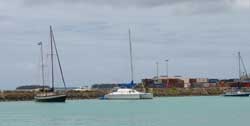 After
a week in the gritty town of Nuka-lofa,
Tonga we are buzzing with excitment about
the upcoming passage to New Zealand. Mustang Sally, our 38 foot ProKennex sailing catamaran has been inspected, serviced
and outfitted with replacement gear from Canada. Blue Water member Lee Lolff joined the boat in
Northern Tonga and brought much needed spares and a bright red
shiny new Canadian flag. The
well worn and faded pink flag that we had used for some 7000 miles across
the Pacific is unceremoniously dumped in the dust bin. After
a week in the gritty town of Nuka-lofa,
Tonga we are buzzing with excitment about
the upcoming passage to New Zealand. Mustang Sally, our 38 foot ProKennex sailing catamaran has been inspected, serviced
and outfitted with replacement gear from Canada. Blue Water member Lee Lolff joined the boat in
Northern Tonga and brought much needed spares and a bright red
shiny new Canadian flag. The
well worn and faded pink flag that we had used for some 7000 miles across
the Pacific is unceremoniously dumped in the dust bin.
A careful inspection of the rig revealed no show stoppers. Sally is loaded with 400 liters of
diesel – almost enough to motor the entire 1,000 miles. That much motoring should not be
necessary as the weather predictions indicated that we would have lots of
wind for the first few days.
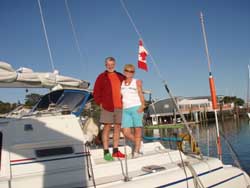 I
am delighted that Graeme Templeton – a Kiwi who had done the passage from Vanuatu to New Zealand recently – wanted to
join us as the third crew member.
Graeme is experienced and familiar with the New Zealand weather. We reviewed the weather faxes together
and agreed this looked a good time to go. I
am delighted that Graeme Templeton – a Kiwi who had done the passage from Vanuatu to New Zealand recently – wanted to
join us as the third crew member.
Graeme is experienced and familiar with the New Zealand weather. We reviewed the weather faxes together
and agreed this looked a good time to go.
Jumping off on the passage to
New Zealand is a nerve wracking weather
worry. The meteorological
reports are perhaps good for 3-4 days and it is at least a six or seven day
sail. There are 10 day predictions but
those are notoriously inaccurate.
The passage is from the southern tropics where the easterly
trades
winds dominate, through the horse latitudes into the temperate zone where
prevailing, but less reliable westerlies dominate.
The voyage means transiting to a zone of more unsettled weather systems that
change much faster than in the tropics.
The systems are more difficult to predict and there are many incidents of
yachts getting beat up on this voyage.
A very early season nearby cyclone has un-nerved us and we were motivated to
get out of Tonga.
An ideal passage to New Zealand
from Tonga
would see one riding steady easterly trades south-south west towards Minerva
reef. If conditions are settled,
a stop at this mid ocean lagoon surrounded by a submerged corral reef could
be interesting. Next one would
encounter the northern edge of an elongated slow moving high with a small
center – (wishful thinking?).
These are the so called ‘horse latitudes’.
Motor sailing for a day or two in light airs would be necessary until the
westerlies on the southern edge of the high fill in.
The westerlies should let you sail the rest of the way.
Chaos comes when fast moving low pressure systems come dashing in from the
northwest or south west pushing the high out of the way. The deeper the low pressure system the
more uncomfortable it gets. Every
once in a while two or three lows will join together and cross over the
route - a weather bomb. Two or three lows joining together can
make for really nasty weather.
All those weather worries have to be brushed aside and a departure decision
made based on limited data. So
we cast off bound for
Opua,
New Zealand. Interestingly, a dozen or so other
boats got underway the same day helping to confirm our departure decision. Although the fleet will spread out over
a few hundred miles of ocean, most will maintain daily HF radio contact.
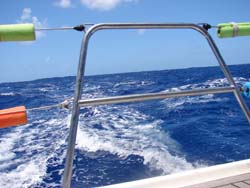 As
we cleared the Islands of Tonga Tapu the easterly
trades are pumping at 15-20 knots.
Mustang Sally is moving at 7-8 knots with the sails reefed down to slow
the boat and increase comfort. The
winds have blown up a rough sea and the boat whacks and slaps on the waves
as we dash across the sea. The continous roar of the water against the hull sounds like a cascading a mountain waterfall. Every once in a while Sally slams into
a really big wave and the bridge deck booms like a resounding bang on a big
old base drum. As we adapt to the
noise everything is settling down into a routine as we ease into to the four
hour watch schedule. As
we cleared the Islands of Tonga Tapu the easterly
trades are pumping at 15-20 knots.
Mustang Sally is moving at 7-8 knots with the sails reefed down to slow
the boat and increase comfort. The
winds have blown up a rough sea and the boat whacks and slaps on the waves
as we dash across the sea. The continous roar of the water against the hull sounds like a cascading a mountain waterfall. Every once in a while Sally slams into
a really big wave and the bridge deck booms like a resounding bang on a big
old base drum. As we adapt to the
noise everything is settling down into a routine as we ease into to the four
hour watch schedule.
New sailors might be surprised that things can get a little boring on a
passage. The GPS and computer systems take the
grunt work out of navigation. As
long as there are no problems with the boat or weather people start looking
for things to do. There is
fishing but when pickings are slim the daily routine tends to get a little
ho-hum. A sign of a good passage!
To help keep things interesting, we like to set up a passage lottery. The lottery is a
points
based contest with daily and passage prizes.
Points are awarded for spotting ships, whales, dolphins, turtles, or
albatross. Bigger points are
awarded for catching fish, spotting land, predicting the half way or arrival
time etc. This helps keep the
watch person sharp and adds fun and competition to the passage.
Daily prizes, usually involve chocolate.
Chocolate often becomes the trip currency – tradable for favors of
various sorts. The chocolate
must be closely rationed by one trusted crew member.
No one is allowed to take a ration of chocolate without earning it
through the lottery.
The passage prize is paid for by the lottery losers. We try and make the prize something
desirable and significant. Our crew are active scuba divers, so I decided on an expense
paid dive on New Zealand’s
premier dive site – The Poor Knights.
Lee is enthused and Graeme is OK with it.
Second day out,
I
quizzed Graeme about the best things to do in New Zealand. Excitement oozed out of him as he
described some adventuresome Kiwi activities.
“How about jumping off the Auckland’s
highest building? Or repelling
down into a cave and black water rafting through a network of underground
caves? How about basking in a hot water creek
at night on Great Barrier
Island with thousands of
candles glowing around you? How about an ocean beach where thermal water springs allow you to bask in hot water pools?
“Sounds great, but what about skiing?” I inquired.
I enthused to Graeme that skiing was “mankind’s greatest use of
gravity”. Graeme immediately
quipped
“go un etter ar yer mate”. ....Huh?..... It took
a few seconds for my brain to translate the Kiwi’ese
to – “Got one better for you mate”.
“What could be better than skiing?” “Sky
diving boss.” Graeme showed us a
video of a dive he did with his son. Lee
and I agreed it looked like a blast.
Skydiving is on both our lifetime list of activities that must be tried.
“Hey! Why not make the lottery prize a free
sky dive. All three of us would
sky dive, but the winner would go free - paid by the other two’? Graeme and Lee agreed without
hesitation. The lottery is
revitalized with everyone eager for points.
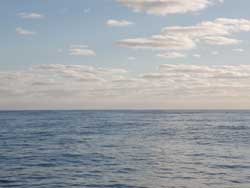 Over
the next few days the winds eased then turned light and variable. We found the horse latitudes and
would need the engines for while.
The boat is comfortably motor sailing across calming seas with occasional
breezes allowing us to shut down the engines for a few hours at a time. The lottery became a big part of our
lives with everyone waiting for the results of the daily run calculations. Over
the next few days the winds eased then turned light and variable. We found the horse latitudes and
would need the engines for while.
The boat is comfortably motor sailing across calming seas with occasional
breezes allowing us to shut down the engines for a few hours at a time. The lottery became a big part of our
lives with everyone waiting for the results of the daily run calculations.
The scheme to keep the crew sharp and observant seemed to be working. Everyone seemed to be alert and in good
spirits throughout the watches.
Everyone wanted to win the sky dive.
With my close attention to navigation, my guesses on the daily runs
were consistently wining and I am building a good lead.
Unfair advantage? Too bad – so sad!
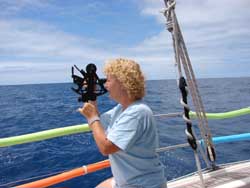 To
even things up a bit, Graeme wanted to do sextant shots with the one closest
to our actual position rewarded 20 points.
As I am pretty rusty on the sextant, my first thought is to protect my
lead and disagree. Graeme had
been doing several shots a day and Lee had been learning how. But - fair play - and to give the
others a chance to catch up, I agreed.
Lucky for me,
Graeme
and Lee’s shots were off, and I am pretty close to bang on. I increased my lead and am feeling
pretty smug. To
even things up a bit, Graeme wanted to do sextant shots with the one closest
to our actual position rewarded 20 points.
As I am pretty rusty on the sextant, my first thought is to protect my
lead and disagree. Graeme had
been doing several shots a day and Lee had been learning how. But - fair play - and to give the
others a chance to catch up, I agreed.
Lucky for me,
Graeme
and Lee’s shots were off, and I am pretty close to bang on. I increased my lead and am feeling
pretty smug.
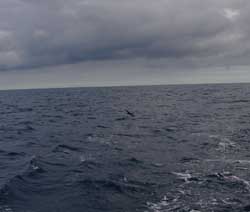 About
a day out of New Zealand,
Lee woke me up from a nap with wild screams of excitement. “An albatross, I
saw an albatross.”
“Yeah, yeah,” I thought. “You
are still 30 points behind”. 10
minutes later she spots another albatross.
Then another 30 minutes later another albatross. About
a day out of New Zealand,
Lee woke me up from a nap with wild screams of excitement. “An albatross, I
saw an albatross.”
“Yeah, yeah,” I thought. “You
are still 30 points behind”. 10
minutes later she spots another albatross.
Then another 30 minutes later another albatross.
“You are seeing the same albatross – girl. He is just circling the boat – your points
don’t count.” “No
no, no – quit trying to cheat - it is a different albatross.”
Lee argued. “Hmmmm…. well
you can have those, but it better be a hugely different bird next time” I
demurred. Lee is closing the
points
gap and I had to be first to spot land to keep the lead.
The air is hazy as we approached
New Zealand and I estimated that we would
not see anything until we were within 20-25 miles. I decided on a nap as Lee came on to
relieve me at 2000. About 2200 I
heard excited screams again – “Land ho”.
The stars had silhouetted the land against the sea and with the help of the Cape Brett
light house, New Zealand
hove into view. Lee got the
big land-ho score and jumped into the lead.
At this point she looked unbeatable and she is bursting with
excitment.
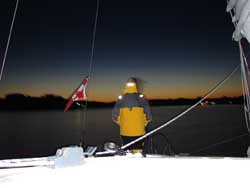 As
the wind faded to a mere whisper we fired up the twin diesels. The sea flattened to mirror calm and
the sky cleared. The stars were cold sharp pin pricks
against the velvet black moonless sky.
We donned our cool weather gear for the first time in months. Mustang Sally barely made a ripple on
the inky black water as we ghosted through the Bay
of Islands towards Opua, New Zealand. The engines hummed quietly through the
still of the night. Only Lee’s
expressions of delight at her wining the lottery broke the sacred silence. As
the wind faded to a mere whisper we fired up the twin diesels. The sea flattened to mirror calm and
the sky cleared. The stars were cold sharp pin pricks
against the velvet black moonless sky.
We donned our cool weather gear for the first time in months. Mustang Sally barely made a ripple on
the inky black water as we ghosted through the Bay
of Islands towards Opua, New Zealand. The engines hummed quietly through the
still of the night. Only Lee’s
expressions of delight at her wining the lottery broke the sacred silence.
We arrived at the Opua customs dock at dawn. Sharon
joined us a few hours later and Graeme’s wife arrived in the afternoon. Graeme got on the phone and lined up a
sky diving company. The next
afternoon Lee and I jumped out of an airplane flying at 3,000 meters. Lee, of course, dove for free. We tandem jumped with experienced
trainers. The views from the light plane and on
the way down were awesome. The
free fall and parachuting is an incredible thrill.
Both Lee and I were emotionally staggered by the thrill of the dive.
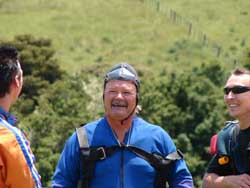 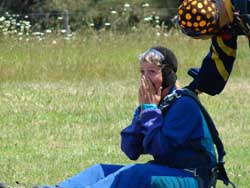
Graeme is right. Sky
diving sure seems like “mankind’s greatest use of gravity.”
|



